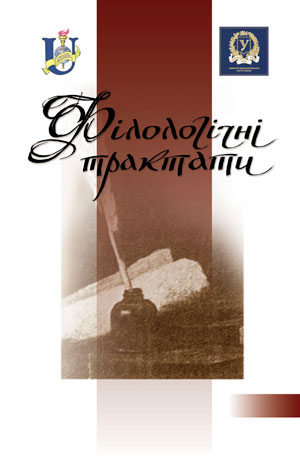LANGUAGE MANIFESTATIONS OF AUTHOR'S PRESENCE IN THE INFORMATION MEDIA CONTENT
Keywords:
media broadcasting, subjective modality, axiological modality, authorial modality, evaluation, types of evaluation meaningsAbstract
In the article the subjective modality of media text as a form of manifestation of the author's presence is examined, the correlation of semantics, nature of evaluation and implicit / explicit influence on the addressee is determined; the functional-semantic and communicative-pragmatic nature of subjectivization of media message is revealed. The application of the descriptive method made it possible to characterize the formal-grammatical and lexical-semantic means of the subjective modality of media texts. The structural method, in particular component analysis, allowed to identify the evaluative component in the semantic structure of lexemes, which is a means of subjectivization of media broadcasting; analysis of vocabulary definitions - evaluative values fixed in the language usage, on the basis of which the evaluative pragmatics of media text is formed. The modeling method contributed to the systematization and semantic-group organization of language means of expressing the author's presence in the media text. The contextual-interpretative method allowed to reveal actual subjective-evaluative meanings, not fixed in the main vocabulary meaning, the optional evaluativeness of which is motivated by contextual-situational conditions. The main means of expressing subjective modality is evaluative vocabulary, in the semantics of which there is a semantic component that can convey a positive or negative authorial evaluation. Axiological interpretation of evaluative vocabulary showed that often the basis of evaluative value is based on social stereotypes, and the author's evaluation is expressed through evaluative judgments, not supported by facts. Moral assessment in media texts is represented by such varieties as ethical, normative, aesthetic, utilitarian ones. Cognitive assessment is realized in the following varieties: rational, represented by the subject-logical component of semantics, conveys the objective meaning of the reported text; emotional forms subjective meanings and promotes subjectivization / authorization / personalization of media messages. The absolute majority has inherent evaluation, individual-author, contextual-situational types of evaluation value are almost not identified. The most productive grammatical means of subjectivizing information content are insert elements that allow the author to express feelings and emotions, mainly as a positive reaction to the reflected fact of reality, assumptions, references to the source of information as a means of personification of the author's image. Modal particles have also active function in media broadcasting, which, realizing the information-evaluation function, actualize the meanings valuable for the author. The word-forming potential of subjective evaluation is much less represented by affixes of quantitative value. Despite the fact that informational texts have a lack of the direct authorial presence, there is a tendency to intensify modal processes in journalistic speech of this genre, which leads to individualization / subjectivization of the text, and thus to the personification of the linguistic personality of the journalist. Subjective authorial modality, on the one hand, helps to establish contact between the author and the addressee of the media message, and on the other - is a violation of journalistic professional standards for objective and impartial presentation of factual information, so they should be avoided in the information messagesDownloads
Published
2022-02-11
How to Cite
Sydorenko, . O., Bondarenko, O., & Vyshniak , L. (2022). LANGUAGE MANIFESTATIONS OF AUTHOR’S PRESENCE IN THE INFORMATION MEDIA CONTENT. Philological Treatises, 13(1), 85–99. Retrieved from https://tractatus.sumdu.edu.ua/index.php/journal/article/view/973
Issue
Section
Articles














